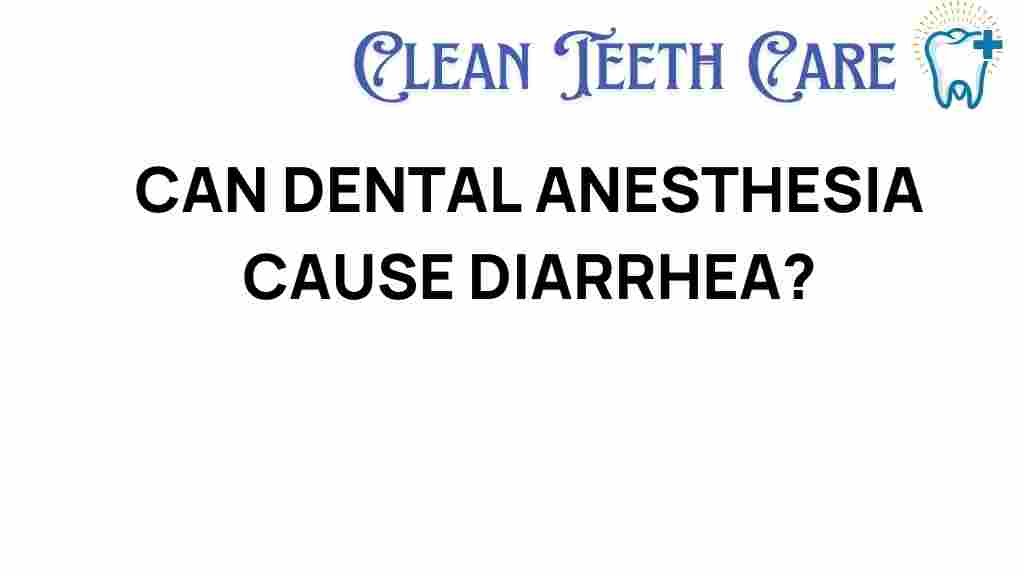The Surprising Link Between Dental Anesthesia and Diarrhea
When we think about dental care, our primary concerns often revolve around oral health, pain management, and the effectiveness of various procedures. However, an intriguing aspect that deserves attention is the potential side effects of dental anesthesia, particularly gastrointestinal issues such as diarrhea. Understanding this connection is vital for patient safety and addressing health concerns that may arise during or after oral procedures.
Understanding Dental Anesthesia
Dental anesthesia is commonly used to ensure patient comfort during dental procedures. It can be categorized into several types:
- Local Anesthesia: This type numbs a specific area of the mouth.
- General Anesthesia: Used for more invasive procedures, this type puts the patient into a deep sleep.
- Sedation Anesthesia: This combines local anesthesia with sedatives to relax the patient while still allowing them to remain awake.
While these techniques are generally safe, they can lead to various side effects, some of which may impact gastrointestinal health.
How Dental Anesthesia Can Cause Gastrointestinal Issues
Research has revealed a potential link between dental anesthesia and gastrointestinal side effects, including diarrhea. Here are some key points to consider:
- Medication Reactions: Some anesthetics and sedatives can upset the stomach, leading to nausea and diarrhea.
- Anxiety and Stress: Dental procedures can be anxiety-inducing, and stress has been known to trigger gastrointestinal problems.
- Dietary Restrictions: Patients are often instructed to fast before procedures, which can lead to digestive irregularities.
- Infection Risks: Though rare, infections can occur after dental procedures, and gastrointestinal upset can be a symptom.
Each of these factors can contribute to the development of diarrhea following dental anesthesia, highlighting the importance of thorough pre-operative assessments by dental professionals.
Medical Research on Dental Anesthesia and Diarrhea
While the connection between dental anesthesia and gastrointestinal issues is not widely discussed, several medical studies have explored this phenomenon. Research indicates that:
- Approximately 5-10% of patients may experience gastrointestinal side effects after receiving dental anesthesia.
- Patients with a history of gastrointestinal disorders may be at a higher risk for post-anesthesia complications.
- Understanding the pharmacokinetics of anesthetic agents can help predict potential side effects.
For more in-depth information on the impact of anesthesia on gastrointestinal health, you can refer to this extensive medical research.
Signs and Symptoms of Gastrointestinal Issues
Patients should be aware of several signs and symptoms that may indicate gastrointestinal issues after receiving dental anesthesia:
- Diarrhea: Frequent, loose, or watery stools.
- Nausea and Vomiting: Feeling sick to the stomach or vomiting.
- Abdominal Pain: Cramping or discomfort in the abdominal area.
- Loss of Appetite: Reduced desire to eat following the procedure.
If any of these symptoms occur, it is crucial for patients to contact their dentist or healthcare provider for guidance on managing these side effects.
Step-by-Step Process to Minimize Gastrointestinal Issues
To enhance patient safety and reduce the risk of gastrointestinal complications after dental procedures, consider the following steps:
- Pre-operative Assessment: Discuss your medical history, including any gastrointestinal issues, with your dentist.
- Medication Review: Make sure to inform your dentist about all medications you are taking, as some can interact negatively with anesthesia.
- Follow Dietary Guidelines: Adhere to your dentist’s fasting instructions, but also communicate any concerns about potential digestive discomfort.
- Post-operative Care: After the procedure, start with clear fluids and gradually reintroduce solid foods, monitoring any digestive responses.
Troubleshooting Tips for Managing Diarrhea After Dental Anesthesia
If you experience diarrhea or other gastrointestinal issues following dental anesthesia, here are some troubleshooting tips:
- Stay Hydrated: Drink plenty of fluids to prevent dehydration.
- Eat Lightly: Begin with bland foods, such as bananas or rice, which are gentle on the stomach.
- Avoid Dairy: Some individuals may become lactose intolerant temporarily after anesthesia.
- Monitor Symptoms: Keep track of the duration and severity of symptoms.
- Consult Your Dentist: If symptoms persist for more than 24 hours or worsen, contact your dentist for advice.
Conclusion
While dental anesthesia is an essential component of modern dental care, it is not without its side effects. The surprising link between dental anesthesia and gastrointestinal issues, particularly diarrhea, underscores the importance of patient safety and awareness of health concerns. By understanding these risks and following the outlined steps for prevention and management, patients can enhance their overall dental experience and maintain good health following oral procedures.
For further reading on how to ensure a smooth dental experience, check out our comprehensive guide on dental care.
This article is in the category Treatments and created by CleanTeethCare Team
